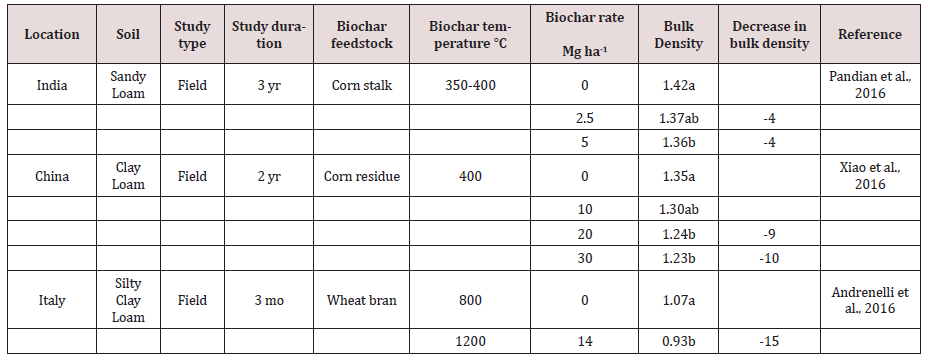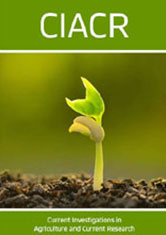
Lupine Publishers Group
Lupine Publishers
Menu
ISSN: 2637-4676
Research Article(ISSN: 2637-4676) 
Impact of Biochar Application on Soil Physical Health Volume 10 - Issue 2
Ruchi Goyal* and M S Kahlon
- Department of Soil Science, Punjab Agricultural University, Ludhiana
Received: January 03, 2023; Published: January 10, 2023
Corresponding author: Ruchi Goyal, Department of Soil Science, Punjab Agricultural University, Ludhiana
DOI: 10.32474/CIACR.2023.10.000335
Abstract
Soil health is the capability of the soil to sustain plant, animal or living beings and it functions as a vital living ecosystem. Soil health indicators include physical, chemical, and biological indicators. Soil physical health is the ability of soil to meet requirements of plants for water, aeration and strength over time and indicators include soil bulk density, porosity, water retention, aggregate stability, etc. that are directly related with the crop productivity and water use efficiency. Nowadays, soil health becomes a critical factor to manage and sustain for human as intensive use of chemical fertilizers have degraded soil health as well as polluted groundwater which leads to low and stagnating yields of the crop [1]. To improve soil physical health and at the same time reduce soil degradation, there is need to adopt an integrated use of organic and inorganic fertilizers. Organic fertilizers consist of farmyard manure, compost, biogas slurry is having high decomposition rate [2]. So, alternative organic fertilizer that is biochar can be applied which is recalcitrant to decomposition for longer period and able to maintain organic carbon status in the soil. Biochar is the product of the pyrolysis of the crop biomass that provides a significant opportunity to transform agricultural residues from the environmental liability to the valuable assets. Biochar is rich in carbon produced by the thermal decomposition of the organic material either in partial or complete absence of oxygen [3]. Therefore, application of biochar in soil has the potential to stabilize organic matter content, helps in carbon sequestration and increases agricultural productivity.
Keywords: Soil health; water retention; aggregate stability; ground water; crop productivity
Importance of Biochar Application in Soil
Biochar can be used as an organic amendment in the soil as it helps in improving the soil physical properties. Biochar is having high porosity and surface area which enables it to retain water and nutrients and also act as habitat for beneficial micro-organisms to grow [4]. Biochar helps to increase water holding capacity of soil because of its porous nature and results in improving water use efficiency. This is because application of biochar would retain more water from irrigation and reduce the frequency of irrigation, hence sustaining and optimizing the limited water available for crop production. Biochar also alters pore size distribution in the soil by reducing proportion of drainable pores [5] and increasing mesopores [6]. The resultant increase in the mesopores with the application of biochar in the soil helps to increase the ability of the soil to retain more plant available water.
Impact of Biochar Application on Soil Physical Properties
The literature on the impact of biochar on soil physical properties is still lacking and soil physical properties are directly related with the soil hydrological properties. Thus, an improved understanding of how soil physical and hydraulic properties respond to biochar application is critical to overall soil performance [7]. Biochar amended soil retained 15 % more moisture content as compared to controlled treatment [8]. Table 1 shows the data of water holding capacity of the soil as affected by different treatments of biochar with nitrogen. It can be seen clearly from the data that combined application of biochar with nitrogen fertilizer resulted in increase in the water holding capacity of the soil as compared to the individual application of nitrogen fertilizer due to higher surface area and porous nature of biochar. Biochar has lower bulk density (<0.3 Mg m-3) than that of mineral soils (1.3 Mg m-3); therefore, application of biochar can reduce the overall total bulk density of the soil which is generally required for most plant growth [9]. Table 2 shows the impact of biochar application on soil bulk density in the upper 15 cm of soil depth for different soils. Biochar increases porosity by 8.4% [10], wet aggregate stability by 3 to 226% and available water by 4 to 130% [7] and decreased penetration resistance of soil by 22.57% [11]. Biochar provides organic binding agents that help in increase in the aggregate stability of soil. It is well known that aggregate stability of the soil is directly correlated with concentration of organic matter in soil. Application of biochar follows two trends i.e., it decreased saturated hydraulic conductivity and infiltration rate in coarse textured soils and increased it in finetextured soils. The first trend is the decrease in saturated hydraulic conductivity and infiltration rate in coarse textured soils is due to the clogging of macropores with the fine biochar particles (<2mm) that interacts with soil inorganic particles and fill the pore space resulting in decrease in water flow. And second trend is the mixing of large biochar particles with small inorganic clay particles results in increased pore space and hence increases saturated hydraulic conductivity and infiltration rate [12]. Improvement in all these properties of the soil would lead to the proper aeration and water supply to the crop which will help in obtaining higher crop productivity as well as water use efficiency [13-15].
Table 1: Water holding capacity of the soil as affected by different biochar treatments in maize crop.

Table 2: Impact of biochar application on soil bulk density in the upper 15 cm of soil depth for different soils.

Conclusion
Application of biochar improves soil physical health by decreasing soil bulk density due to its porous nature, increases water holding capacity of soil, and improves aggregate stability and water transmission characteristics of the soil. The results of the biochar application in soil depend upon the type of biomass used to make biochar, temperature of pyrolysis, particle size of biochar, etc. The improved soil physical health will ultimately lead to higher crop productivity. Under limited resource conditions, the optimum productivity can be achieved with biochar application along with lower dose of chemical fertilizers and lower irrigation levels. Biochar can be a viable option to use in integrated nutrient management instead of individual application of chemical fertilizers that are deteriorating soil health and polluting ground water.
References
- Lal R (2020) Tribune India.
- Palm C A, Gachengo C N, Delve R J, Cadish G and Giller K E (2001) Organic inputs for soil fertility management in tropical agro ecosystem: application of an organic resource database. Agric Ecosys Environ 83(1-2): 27-42.
- Lehmann J, Da Silva J P, Steiner C, Nehls T and Zech W, et al. B (2003) Nutrient availability and leaching in anarchaeological Antrosol and Ferralsol of the central Amazon Basin: Fertilizer, manure and charcoal amendments. Plant and Soil 249(2): 343-357.
- Warnock D D, Lehmann J, Kuyper T W and Rillig M C (2007) Mycorrhizal responses to biochar in soil-concepts and mechanisms. Plant and Soil 300(1-2): 9-20.
- Petersen C T, Hansen E, Larsen H H, Hansen L V and Ahrenfeldt J, et al. (2016) Pore-size distribution and compressibility of coarse sandy subsoil with added biochar. Eur J Soil Sci 67(6): 726-36.
- Lu S, Sun F and Zong Y (2014) Effect of rice husk biochar and coal fly ash on some physical properties of expansive clayey soil (vertisol). Catena 114: 37-44.
- Blanco Canqui H (2017) Biochar and soil physical properties. A review-Soil Physics & Hydrology. Soil Sci Soc Am J 81: 687-711.
- Laird D A, Fleming P, Wang B, Horton R and Karlen D (2010) Biochar impact on nutrient leaching from a midwestern agricultural soil. J Geoderma 158(3): 436-442.
- Brady N C and Weill R R (2004) Elements of the Nature and Properties of Soils, 2nd ed Pp 111-112.
- Omondi M O, Xia X, Nahayo A, Liu X and Korai P K, et al. (2016) Quantification of biochar effects on soil hydrological properties using meta-analysis of literature data. Geoderma 274: 28-34.
- Goyal R and Kahlon M (2022) Soil physico-chemical properties and water productivity of maize asaffected by biochar application under different irrigation regimes in northwest India. Commun Soil Sci Plant Anal 53(1): 1-17.
- Githinji L (2014) Effect of biochar application rate on soil physical and hydraulic properties of a sandy loam. Arch Agron Soil Sci 60: 457-470.
- Andrenelli M, Maienza A, Genesio L, Miglietta F and Pellegrini S, et al. (2016) Field application of pelletized biochar: Short term effect on the hydrological properties of a silty clay loam soil. Agric Water Manage 163: 190-196.
- Pandian K, Subramaniayan P, Gnasekaran P and Chitraputhirapillai S (2016) Effect of biochar amendment on soil physical, chemical and biological properties and groundnut yield in rainfed Alfisol of semi-arid tropics. Arch Agron Soil Sci 62: 1293-1310.
- Xiao Q, Zhu L, Zhang H, Li X and Shen Y, et al. (2016) Soil amendment with biochar increases maize yields in a semi-arid region by improving soil quality and root growth. Crop Pasture Sci 67(5): 495-507.

Top Editors
-

Mark E Smith
Bio chemistry
University of Texas Medical Branch, USA -

Lawrence A Presley
Department of Criminal Justice
Liberty University, USA -

Thomas W Miller
Department of Psychiatry
University of Kentucky, USA -

Gjumrakch Aliev
Department of Medicine
Gally International Biomedical Research & Consulting LLC, USA -

Christopher Bryant
Department of Urbanisation and Agricultural
Montreal university, USA -

Robert William Frare
Oral & Maxillofacial Pathology
New York University, USA -

Rudolph Modesto Navari
Gastroenterology and Hepatology
University of Alabama, UK -

Andrew Hague
Department of Medicine
Universities of Bradford, UK -

George Gregory Buttigieg
Maltese College of Obstetrics and Gynaecology, Europe -

Chen-Hsiung Yeh
Oncology
Circulogene Theranostics, England -
.png)
Emilio Bucio-Carrillo
Radiation Chemistry
National University of Mexico, USA -
.jpg)
Casey J Grenier
Analytical Chemistry
Wentworth Institute of Technology, USA -
Hany Atalah
Minimally Invasive Surgery
Mercer University school of Medicine, USA -

Abu-Hussein Muhamad
Pediatric Dentistry
University of Athens , Greece

The annual scholar awards from Lupine Publishers honor a selected number Read More...




